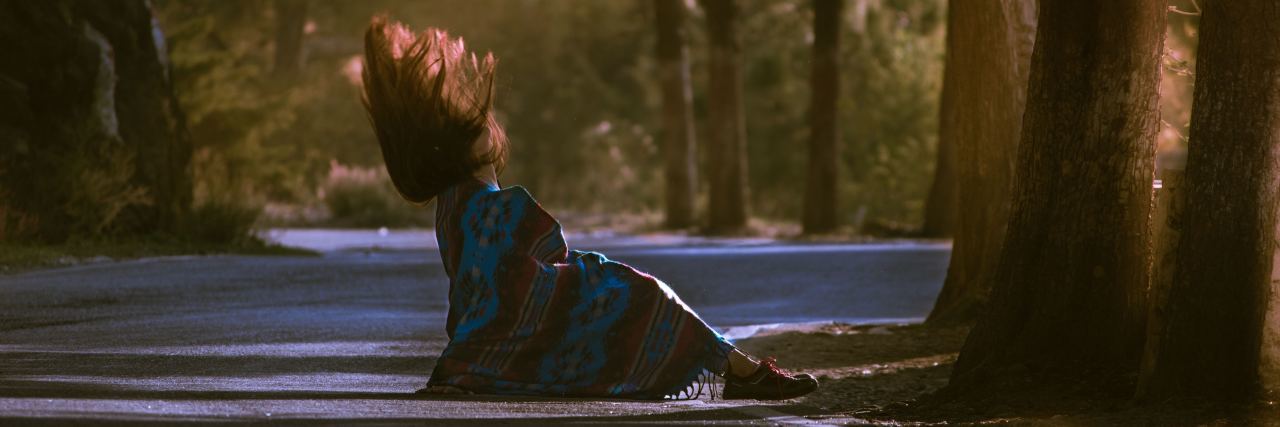When Childhood Mental Illness Affects Your Chronic Illness as an Adult
“Why do I even bother to eat when my body barely works in the first place?”
Before having that thought and succumbing to the actions (and consequences) thereafter, I had just had one of the worst flare-ups of my life.
I have a condition called postural orthostatic tachycardia syndrome (POTS) which is a form of autonomic nervous system (or dysautonomia). This basically means that the things you don’t have to consciously regulate, like heart rate, blood pressure and everything down to digestion, don’t function properly. Things misfire and I end up feeling like death. I have other health conditions, but this POTS flare-up brought me to my knees. I was hardly able to manage getting off the couch or out of bed just to get to the bathroom in my tiny studio apartment for over a month. Every time I’d get up, my heart rate would sky-rocket and my blood pressure would tank, leading to near black-outs — and far more than I care to remember. I even got so sick that I ended up with a blood clot (deep vein thrombosis) in my calf, and bits broke away and traveled to my lungs. This blocked much of my oxygen, as the clots were massive, so I was hospitalized and am lucky to still be alive. But the thing is, prior to my health becoming so poor, I also struggled with mental illnesses.
Awful, painful body image struggles and mental health issues taint even my earliest memories. I was the kid who had panic attacks at the age of 4, with a mom who used guided imagery to soothe me back to sleep (something I learned was a tool in therapy well over a decade later). I used food to cope with depression and anxiety, and by the time I was 5 years old, I cried about my weight and hated every inch of myself no later than age 7. My childhood was difficult to manage with my parents’ divorce, my father’s blatant abuse and neglect, and severe bullying at my one safe haven — school. I grew to eventually witness my father’s drug abuse, be present during a drug deal itself and have my life be at risk. And as I developed a voice of my own and became a real person, the abuse was readily circled around to me. I never told my mom, or anyone for that matter, some of the things that took place until many years after it all began, and I was already lost deeper than ever in my own mind.
When I was in high school, my mental health collapsed. I began self-harming my freshman year and honestly don’t even remember when restriction and purging began. I just fell apart and, if it weren’t for one educator in particular, I would have ended my life my senior year. But I kept on, and both years and numerous hospital admissions later, I got better. Until that day.
Chronic illness can be debilitating. It is expected that someone who is chronically ill will develop depression. I had been diagnosed with mental illness many years prior, so I just crumbled once again.
The thought that popped into my head that day led me to almost stop eating entirely — mostly due to depression, but with my eating disorder still lurking in the background. I had to re-enter residential eating disorder treatment to gather myself back up and get my mental health under control. As I went to groups, saw my therapist, attended medical appointments and even made friends, I felt as though I was finally starting to breathe again. It took everything in me, and then some, to survive — and I couldn’t have done it alone.
There is no question how someone can get painstakingly depressed when they’re sick. When your own body seems to be disintegrating within you and completely falling apart, how can you blame someone for becoming clouded? For life not seeming so worth it anymore? When a person can’t manage to walk or even sit up, see their friends, go to school or work or have what feels like anything left, do you really blame them?
I wish I could get back all of the missed time. I wish I could get back my health. I wish I had been able to stay in school last term, despite my health, and function like others my age. I wish I could take back attempts I made to end my life. But I can’t and, even if I could, maybe I shouldn’t. All of those things and more have made me who I am today, and because of what I have survived (and continue to survive), I am kinder. I am more considerate. I go the extra mile when I know someone is ill or hurting or sad. I do whatever I am able, and I live every moment I can like it’s my last. Once I improved enough medically and I was out of acute care for my mental health, I took my service dog in training and went to a nearby lake. I took pictures and laughed and felt for the first time in what felt like forever like I was finally alive again.
No, my life may not be what I would have imagined, but it is kind, it is good, and it is blessed. I love more every day because of my illnesses — all of the illnesses. My disabled life has brought me more and is more than enough. Especially on the days where I fight the hardest — and even when I cannot see it — my life is beautiful.
Getty image via Tushar Escape

